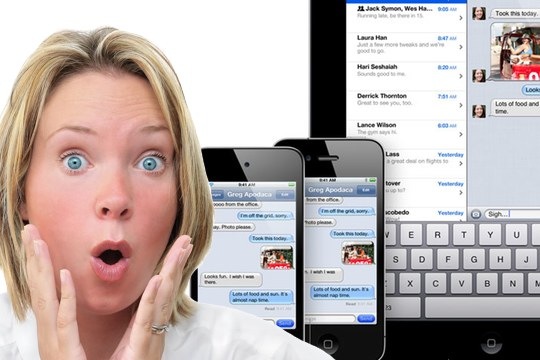With a markup that seems like it passes that bazillion percent mark, it’s no surprise that people are a little bit disenchanted with the carriers’ SMS rates these days. Okay, a bazzillion is an exaggeration, but studies have guestimated that the average cellphone carrier marks up a text message 4,090 percent. We didn’t mistakenly add a digit to that number. The markup is actually four-thousand and ninety percent. Apple, and plenty of companies before it, have taken steps to try to regain control of a communications medium that has clearly run away on customers. But unlike those who have come before it, with the exception of RIM, Apple may be taking a huge chunk of change out of the carriers’ pocket by offering an alternative messaging service on their phones. And, they’re not even going to be charging customers for the luxury of using iMessage (clearly that draconian Apple strikes again).
Apple will roll out iMessages tomorrow inside the iOS 5 update, and it’s starting to sound like those carriers we’ve all grown to love over the years will be getting worried about where their super-marked up SMS revenue may be heading. By all accounts, it sounds like it could be heading directly into the toilet.
I mean, simply put, iMessages is going to do exactly what the carriers hoped would never happen; it’s going to re-route traditional text messages through a user’s data plan instead of over the cellular network. The technologically inclined realize that there’s very little differentiating the sending of an SMS message and the sending of a packet through a data plan these days. Carriers, quite literally, bank on the fact that the general population misunderstands how these technologies work, thereby charging them a premium for sending one kind of packet over another.
The carrier’s saving grace is that Apple is only circumventing the SMS system if the person on the other side of a message is using an iOS device. That means the message will be sent to iPhone, iPad, and iPod touch owners free of charge, over the data network, or Wi-Fi. Should someone with an iPhone attempt to message a Blackberry, Android, or non-smartphone user, the phone will send a traditional text message to the recipient.
SMS may not be dead, and most people, myself included, won’t be running out to cancel their SMS plans, but the new approach is certainly going to lower the reliance on the SMS plans carriers have grown to love, and it could seriously begin to threaten the $20 billion dollar text messaging industry.
It all begins with iOS 5.
iMessage, only available in iOS 5, will automagically determine whether or not a message can be delivered SMS free or if it should send out a typical SMS message. I say automagically because it’s quite magical. The user doesn’t have to determine whether or not they’re attempting to message an iOS device; instead iMessage figures it out, and then takes the appropriate route to deliver the message.
iMessage is the merging of SMS and instant messaging in a way that no other company has really pulled off successfully in the past. Users don’t know it’s happening, and instead, it just happens when it needs to happen.
Source: New York Times








